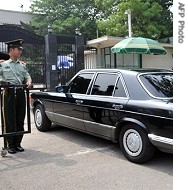-
(单词翻译:双击或拖选)
By Kurt Achin
Seoul
07 June 2008
Senior Japanese and North Korean envoys2 are seeking to end almost a year of diplomatic silence with each other as they meet this weekend in the Chinese capital. The discussions are partly aimed at facilitating upcoming negotiations3 on getting rid of North Korea's nuclear weapons. VOA's Kurt Achin reports from Seoul, where South Korean officials are also preparing for the multinational4 nuclear talks.
 |
| Chinese paramilitary embassy guard opens gate for arrival of N. Korean envoy1 Song Il-Ho at Japanese Embassy in Beijing, 07 Jun 2008 |
Senior Japanese officials expressed only modest expectations Saturday, as North Korean and Japanese envoys arrived in Beijing for their unofficial meeting. The two sides hope to resume more formal one-on-one meetings connected to six-nation talks aimed at getting rid of North Korea's nuclear weapons.
Japan, the two Koreas, Russia, China, and the United States agreed last year on a multi-phase process which would gradually reward Pyongyang for nuclear disarmament actions. If successful, the process would eventually lead to diplomatic normalization5 between North Korea and both Japan, and the United States.
Prior to leaving for Saturday's talks, Japan's senior delegate to the nuclear process, Akitaka Saiki, said he hopes the North Koreans come to the table with a sincere attitude.
He says he hopes the bilateral6 exchange goes well, because it will lay the groundwork for more talks in the future.
No breakthroughs are expected with regard to the main difficulty in relations between North Korea and Japan: the issue of abduction of Japanese nationals by North Korean agents in the late 70s and 80s.
North Korea has admitted to kidnapping 13 Japanese citizens. Pyongyang returned five and said the other eight are dead. Japanese officials believe there were more abductions, and that North Korea has failed to cooperate sufficiently7 in accounting8 for the individuals in question.
North Korea has frequently accused Japan of distracting from the nuclear negotiations with the abduction issue, and has called for Tokyo's removal from the process.
Experts say successful diplomacy9 between Pyongyang and Tokyo could lead to significant benefits for the impoverished10 North down the road. Japan colonized11 the Korean peninsula during the first half of the 20th century, and Tokyo would be likely to provide billions of dollars worth of aid to North Korea as an indirect form of reparations - if ties between them can be normalized.
Japanese and North Korean envoys are likely to meet again before the end of the month at the six-party nuclear table. A senior U.S. official arrives here in Seoul Monday before traveling to Pyongyang, to help prepare the session.
 收听单词发音
收听单词发音
1
envoy

|
|
| n.使节,使者,代表,公使 | |
参考例句: |
|
|
|
2
envoys

|
|
| 使节( envoy的名词复数 ); 公使; 谈判代表; 使节身份 | |
参考例句: |
|
|
|
3
negotiations

|
|
| 协商( negotiation的名词复数 ); 谈判; 完成(难事); 通过 | |
参考例句: |
|
|
|
4
multinational

|
|
| adj.多国的,多种国籍的;n.多国籍公司,跨国公司 | |
参考例句: |
|
|
|
5
normalization

|
|
| n.(normalisation)正常化,标准化 | |
参考例句: |
|
|
|
6
bilateral

|
|
| adj.双方的,两边的,两侧的 | |
参考例句: |
|
|
|
7
sufficiently

|
|
| adv.足够地,充分地 | |
参考例句: |
|
|
|
8
accounting

|
|
| n.会计,会计学,借贷对照表 | |
参考例句: |
|
|
|
9
diplomacy

|
|
| n.外交;外交手腕,交际手腕 | |
参考例句: |
|
|
|
10
impoverished

|
|
| adj.穷困的,无力的,用尽了的v.使(某人)贫穷( impoverish的过去式和过去分词 );使(某物)贫瘠或恶化 | |
参考例句: |
|
|
|
11
colonized

|
|
| 开拓殖民地,移民于殖民地( colonize的过去式和过去分词 ) | |
参考例句: |
|
|
|















